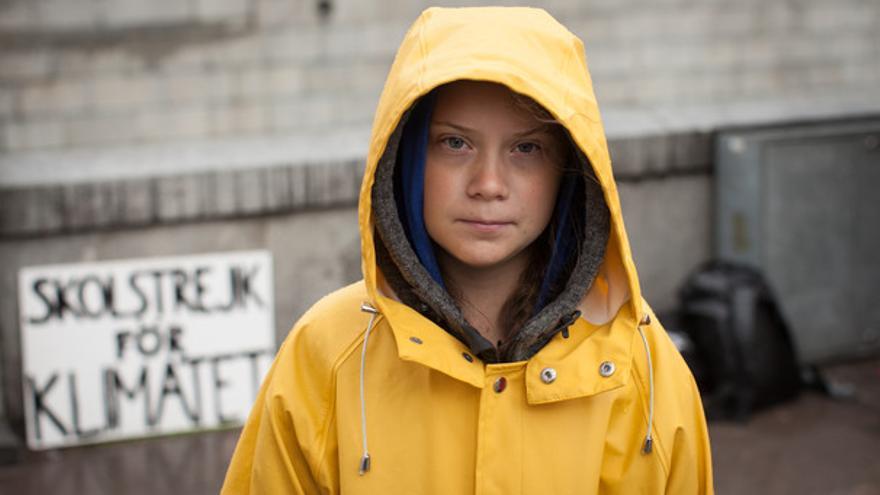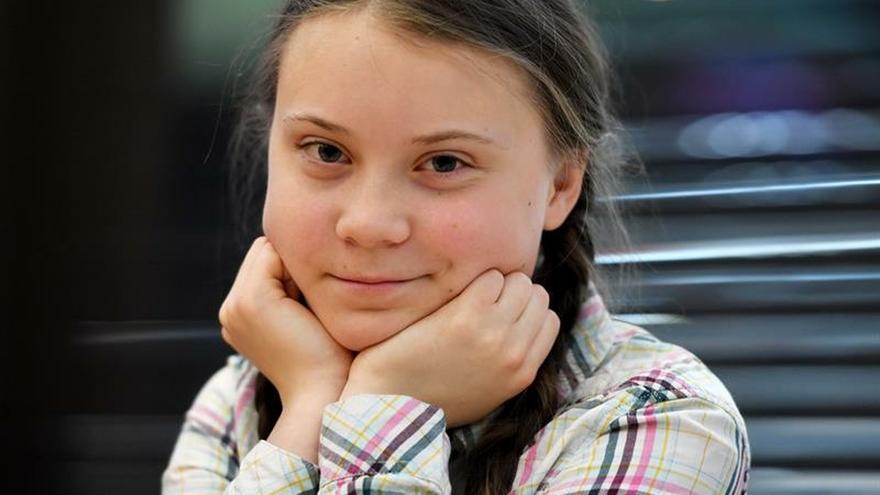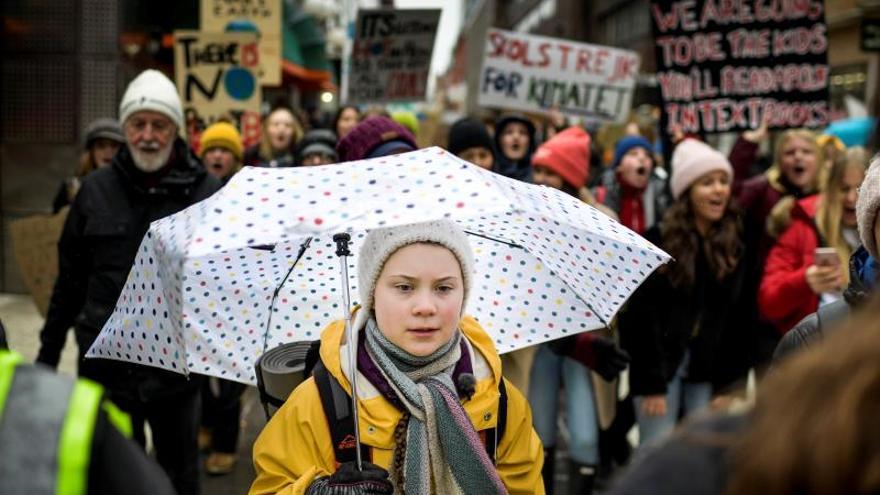Woman, young, rich, asperger ... Why does Greta Thunberg bother you so much?

On the dais, a girl. In front of her, representatives of all the countries of the world, journalists, politicians and businessmen. Start talking: "(I come) to tell you that adults must change your ways. I don't have a hidden agenda. I am fighting for my future. (...) All this is happening in front of your eyes and yet we act as if we had all the time we would like to. (...) Adults say you love us, but I challenge you, please, to have your actions reflect your words. Thank you. "
If you have imagined Greta Thunberg speaking these words at a congress on the weather, he is wrong. This harsh speech was delivered by the activist Severn Cullis-Suzuki, then 12 years, during the Earth Summit in Rio de Janeiro (Brazil) in 1992. The young Canadian, however, did not suffer the criticism that her Swedish counterpart receives today. If you have not heard of his intervention it is because, at best, it was ignored.
It is true that Cullis-Suzuki, unlike Greta, lived in a world without internet. Even so, it is worth asking why the Swedish harvest, at 16, fierce attacks that exceed those received by Al Gore over a decade ago. In the case of Thunberg, many of the criticisms go beyond his speech, they arrive at personal land and even do target in his condition of asperger. "The international mascot of climate alarmism," "mentally unstable," "petulant girl" and "deeply disturbed messiah" are just a few examples.
The main suspects of so much tyranny are the denialists, who reject that climate change takes place or that it is due to the action of the human being. It is a posture with little support inbetween the Spanish –Which are among the citizens most concerned about this issue–, but with many adherents in countries such as the United States, United Kingdom and Norway.
The profile of the denialist: man and conservative
"It upsets the denialists, especially men in the United States, because their tactics do not work with her, what happens from what others say," explains environmental disseminator Andreu Escrivà to SINC.
There are few studies and surveys who have tried to draw a "profile of the climate denier", which tends to be man and conservative. This has led some researchers to analyze the possible relationship between denialism and misogyny. The sociologist at Chalmers University (Sweden) Martin Hultman It is one of them.
"There are three groups of climate deniers: CEO of extractive industries, politicians financed by them and conservative men," Hultman summarizes to SINC. "When a woman presents results that imply that these individuals, businesses, ideologies and structures need to change, it is not surprising that they try to kill the messenger."
Hultman refers to a type of mentality that "does not see nature as something vulnerable that can be destroyed" but as something to exploit because "economic growth is more important than the survival of humanity."
Surveys show, Hultman explains, that this way of thinking is more frequent in conservative men, who accept denial arguments more frequently. In fact a 2016 study He pointed out that one reason why they are less respectful of the environment is because they perceive their defense as a feminine attitude.
"Many see Greta as an evangelist who tells you how you have to live, a 40-year-old man from a developed country, and does not talk about China or India, who have a brutal growth in CO emissionstwo", writes Escrivà, who reflects:" Do we really think that a teenager has to give all the speeches for all issues? It's been enough to give a touch of attention to those of us who live in a western society. "
Adults vs. children
Denialists and misogynists aside, Escrivà believes that Greta's 16 years represent a generational shock that can be counterproductive to convey his message. "It seems positive to revindicate the future, but the elders are told that they are guilty, when there are many people who are not, and that galvanizes you against the message. One thing is to teach a rapper who goes by private plane and another, to tell you what to do to people whose life is already difficult. "
The psychotherapist at the University of Bath (United Kingdom) Caroline Hickman has analyzed why some adults seem to reject activist youth. "Many project their own fears and anxieties on it, and unconsciously reject it as a way to get rid of them," he says.
Consider that it is an example of children who behave like adults and adults who do it as children: "These attacks are child tantrums of adults who do not have the psychological maturity necessary to contain their emotional responses. As for those who insult Greta, consider that "they do bullying to try to recover a power that they feel they have lost. "

Teen activist Greta Thunberg
EFE
In defense of neurodiversity
"She seems like a very happy girl", mocked the president of the United States, Donald Trump, through Twitter after Greta's speech at the UN. The politician ignored the fact that the young activist expresses herself normally for a person with Asperger's syndrome, who responded adding that description to your profile.
The neurobiologist of the University of Salamanca specialized in autism José Ramón Alonso believes that one of the reasons for the rejection of Greta may be our lack of habit to see patients with autism spectrum disorder (ASD) in the public sphere.
"They are people who have problems transmitting emotions with body language and tone of voice, and they have a hard time adapting to different situations," Alonso explains. "We are not accustomed to someone having expressions that are poorly adjusted to a situation, and it is unfair that we ask them to do so."
The researcher believes that his popularity can be positive to make visible not only the climate crisis, but also "the contribution that people with ASD can make to our world." This as long as it is accompanied by an "education." "If not, we will return to discrimination and prejudice, and to tell families that their children are poorly educated."
Can it be Asperger's syndrome, as Greta states, a "superpower" in the fight against climate change? "It is true that (asperger people) focus on an issue that is of utmost importance to them and sometimes they don't know how to transmit it or take advantage of it. Their attention to detail is key, even if they later have greater difficulties in social interaction."
Add to this the fact that other teenagers tend to be "very aware of hierarchies." "(The aspergers) understand that less and say things with a rawness and sincerity that in many cases is a positive value."
In this sense, part of the criticism of Greta lies with her parents for allowing a teenager with Asperger syndrome to become an activist. "I know a mother who said her son was going to be a 'modern autistic," says Alonso, "instead of cutting their chances."
For all this he defends that we should be better with them and give them their space. "There are different people and the solution cannot be the only size. It is our responsibility to make them a site, value them and understand them."
An uncomfortable truth
For many factors that may contribute to Greta's rejection, they only serve as an excuse to repudiate his message. This advocates changes in our way of life and in the system itself and, above, with emergency. "He says that you have to put the batteries and that everyone should do what they can to stop this. That a lot of people do not like because nobody wants to change their habits," explains Professor of Applied Physics at the University of Alcalá Antonio Ruiz de Elvira Serra.
"When you confront people with real decisions that you have at your fingertips to fight against climate change, you are very uncomfortable," says Escrivà. "He blew me away when Greta went to The Daily Show, said a very good speech and the public began to applaud, "he recalls." I thought that if they were able to translate their words to a level of emission cuts in their daily lives they would not applaud, let alone in the United States, that is the country with the largest ecological footprint per person. "
A 2017 study explored how recommendations to reduce emissions often obviate the most effective actions. "Recycling, maintaining the right temperature and installing LEDs is the least important. What is most renewable energy, reducing meat consumption and leaving the car and the plane," explains the disseminator. "They are things that itch much more and people, when they understand that, hallucinate."
"Isolating the house and leaving the car is complicated and not everyone can, but we can show politicians and Business who have signed up to sponsor COP25 that we don't buy their products if they don't change, "says Ruiz de Elvira." This is a message that comes to them ... don't see how! ", he adds about the reasons why Greta's message" punctures "so many.

Greta Thunberg during a demonstration
EFE
Beware of magic solutions
Escrivà is clear about his main criticism of Greta: "It perpetuates a worldview in which there is a magical solution that politicians are not applying, but could do so if they listened to scientists."
The disseminator believes that presupposing that the action against climate change does not take off because of the lack of information is "very simplistic" and argues that politicians "have long been listening to scientists." He says that political inaction "responds to interests, short-termism, inertia, fear of assuming the political cost, difficulties in changing our way of life and that the citizens do not want".
"We are with Greta, but we outsource our environmental activism based on likes to her and we think that with that we are already green. "This" detaches us from the real changes that we must incorporate and promote, because the action must be collective, not just the politicians. "
(embed) https://www.youtube.com/watch?v=I-XGJ9Y5CnE (/ embed)
Escrivà regrets that the young activist does not exemplify this change in values, since she carries out actions hard to imitate for the rest of the population, which cannot depend on the Grimaldi leaving a ship to go from the United Kingdom to New York, or that some sailors take it by catamaran from Salt Ponds to Lisbon.
"The real change is not to come to Spain anyway. It is to ask yourself: do I need to go to Madrid?I don't give a better example to many people if I go to a meeting as important as COP25 by videoconference? "
Therefore, he fears that hyperperfection will lead many people, unable to do without plastics or the car overnight, to throw in the towel. "I care more than 80% of the western population reduce 50% the use of plastics or flights that a small elite of 5% do everything right, because that demoralizes."
He also fears that shouting "the wolf is coming" causes rejection against the cause when, in ten years, "the world is not over." "There will be more droughts, hurricanes and some invasive species, but it won't be Mad max. In forty years we will see. "
The new denial is to do nothing
"It squeals that a teenager with an extraordinary quality of life says that they have stolen the future. They have not robbed us of the future: they have left us a broken world, we must rebuild it and demand responsibilities, but millions of children are being robbed of the present ", says Escrivà. "Not everything is climate change, the world is complex and I find dangerous any message that tends to simplify it," he adds in reference to companies that "get on the cart" of sustainability but "not to the rights of workers."
The consequence of these magical solutions and, in the words of Escrivà, to think that companies are bad per se, is to fall into the new denialism: the denial of solutions. In other words, do nothing until governments and corporations do it. "The hundred companies that produce 70% of the world's greenhouse gases do not do so because they have a button that emits COtwo, but because they make the cement and steel of your house and the oil of your car. "
The problem, according to the reporter, is that "if everyone waits for someone to do something, then nobody does anything." He considers that "we will always find ways to self-justify and not lower our consumption", and that is why "we must give ourselves the least number of excuses" to maintain inaction. "If in your mental scheme you are the good and the others the bad, why are you going to do something?"
For all this, Escrivà sees Greta as a "battering ram" that opens the doors, but must be accompanied by the rest of the army to serve as something. "He is a conversation trigger, but I think he has already played his role."
His best legacy, he says, "would be that we stop talking about what he does and have a conversation beyond, how the change of landscape affects us, if we are willing to leave the plane and the car." All that, while supporting the Gretas around us.
. (tagsToTranslate) annoys (t) Greta (t) Thunberg
Source link










